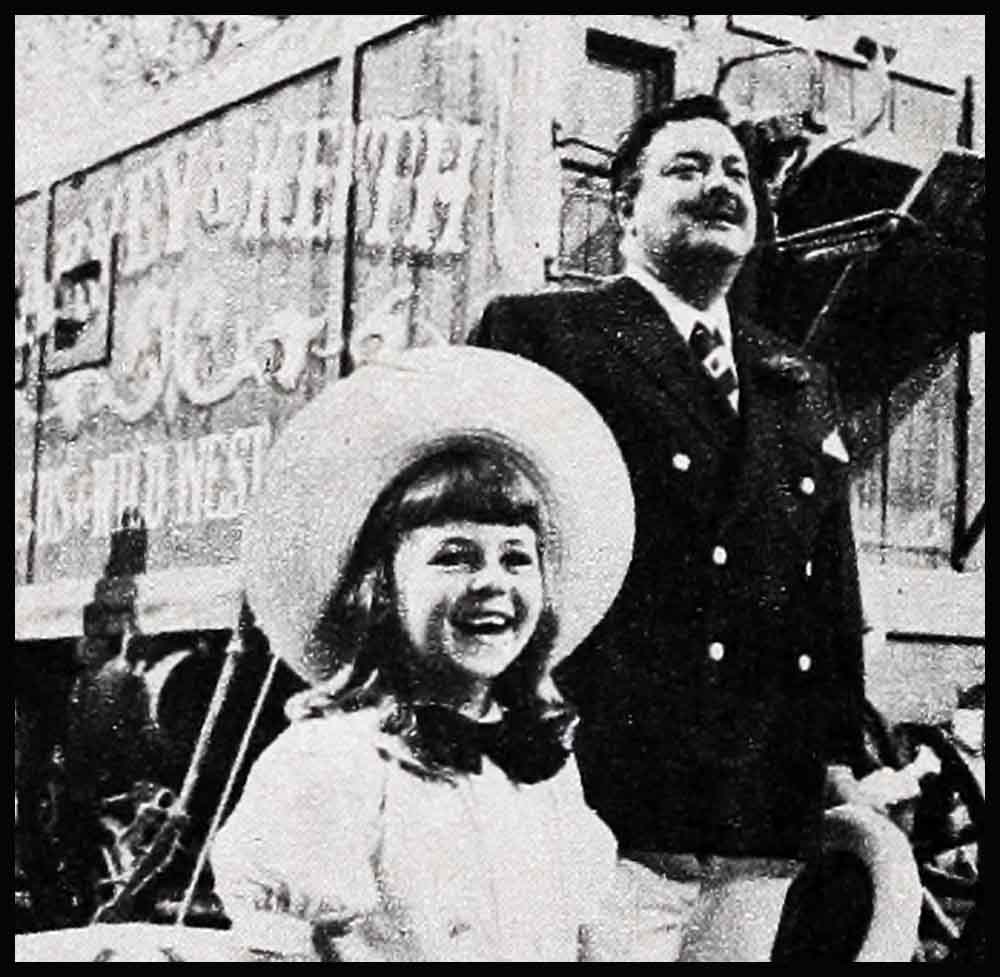
Jackie Gleason’s Delicate Condition
If you could kick the person responsible for most of your trouble you wouldn’t be able to sit down for weeks,” admonished the Great On Jackie Gleason.
And Jackie shout know. Because it is capsule summary of—borrow a phrase fro PHOTOPLAY columni Walter Winchell-The Great Wasteband’s own life and times.
Jackie was on the so of “Papa’s Delicate Condition” talking about delicate condition of he own—his habits of (1) putting his foot in he mouth and (2) kicking himself in the seat his pants. It appear that the Great One worst enemy is no on but Gleason himself.
But that day he we feeling no pain, having at hand plenty of own patented pain kills—booze—and he could talk about his opulent present and hungry part without a wince.
“The working contions here are ideal!” said. “They set up a bar right next to my dressing room—so I don’t have to smuggle.
“And what a bar, pal, it’s gorgeous! Beautiful. Just the size of Toots’ old place.” (Toots, to she uninitiated, is Toots Shor, Jackie’s favorite drinking companion and owner of Jackie’s favorite saloon.) “It’s all plush velvet, in red, and elegantly appointed in Gay 90’s decor. It’s furhished, you see, all in excellent Nouveau Booze.
“Why, I even have a fat guy standing at one end of it—playing Toots and drinking, of course. We had the entire Paramount office scrounging for an actor who looks like Toots, just so I wouldn’t be lonesome. Naturally, we cast the guy from the zoo.
“Since the bar opened, I’ve done away with the coffee wagon out here and instituted a thing called the booze cycle.”
Yes, these are the Great Days for the Great Gleason. He’s got his own “boozecycle” with a boy assigned by the studio to do nothing all day but push it from the bar to Jackie and back to the bar again for refills. He’s got a truckful of money Corning in each week. And he’s got the right to exercise the privileges of stardom by showing up on the set in this outfit: an orange pith helmet decorated with an orchid, a multi-colored striped shirt, plaid walking shorts, knee length black stockings, spats and black shoes. Clearly, he’s got it made.
But it wasn’t always like this. And Jackie remembers those days.
“The last time I was out here they wouldn’t even buy me a drink, much less my own bar. But I’ve got to go along with them. I wouldn’t have a drink with me then either . . .”
That was back in ’42. Film producer Jack Warner had seen him at the Club 18 in New York and decided that he was the funniest man alive. He signed Jackie to a film contract, and away to the Coast the comedian went.
His self-induced problems started even before he reached California. He has said: “Gambling? Let’s not even talk about that. The guy who invented playing cards cost me a lot of money.” But back in 1942 Jackie was convinced that anything anyone else could do he could do better—and that included card playing, of course.
As Gleason recalls it, “I started out for the Coast. In Chicago I found out I could change my ticket and stay overnight. I ran into Red Skelton, Danny Thomas and a couple other guys there and I did some gambling . . . I lost everything but about six bucks. I knew I couldn’t eat in the dining car all the rest of the way to Hollywood on that, so I got off at some clam- town stop, bought me a big box of Baby Ruths, and Baby Ruthed myself all the way to Hollywood. I was so hungry when I got there I could have eaten wheat germ.”
He didn’t have to try wheat germ—at least not right away. But he had to munch on something far worse, for Gleason. Hollywood forced him to eat crow.
As Jackie tells it, “They wanted me because I was so funny. Then they forgot why they brought me out. Or if I did get a role the assistant director always said, ‘Gleason, hold this pistol.’ ”
Now he tried wheat germ—a steady diet of it. He pared down to one hundred eighty-five pounds—perhaps they’d take notice of him if there wasn’t so much of him to notice. But the studio big-shots said a thin Gleason just wasn’t funny.
So he started stuffing himself during the day and sneaking down to the ice box (and the bar) at night (resembling, therefore, a “Volkswagen in pajamas”), and his weight shot up. Fat and funny again, he was miscast in “All Through the Night,” “Springtime in the Rockies,” “Navy Blues,” “Tramp, Tramp, Tramp” and “Orchestra Wives.”
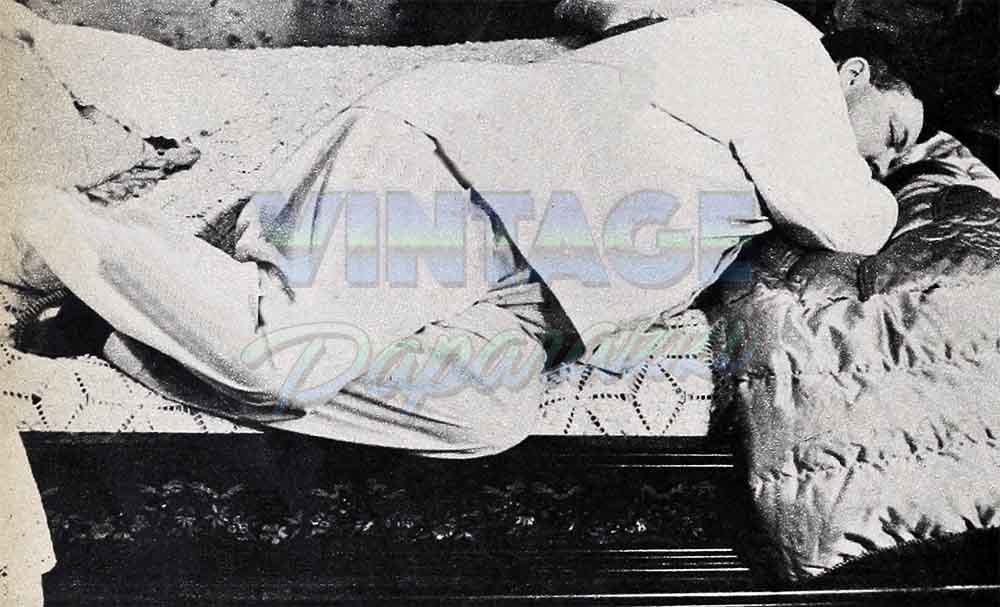
Blue-eyed Arab
Jackie’s facility for opening his mouth wide and then putting his foot in it is fully illustrated by what happened when he made his last picture during that first trip to Hollywood. “It was called ‘Desert Hawk,’ and it was a lulu,” Gleason says.
“I went to see the producer, and while I’m there he’s having a pedicure, I want you to know. He was saying, ‘Watch out, Mildred, how you cut the big toe,’ and I was telling him what a great Arab I would make.
“Finally he said: ‘Can you ride?’ I said I could ride like the wind—I had never been on a horse in my life. He said: ‘Can you duel?’ I said I was a whiz at fencing—I didn’t know the first thing about it.
“Then he said, ‘You can’t have the job.’ I said why not, and he said: ‘Because you got blue eyes, and Arabs don’t have blue eyes.’
“I said: ‘Then you’re in trouble, bud, because your leading man has two of the bluest eyes I’ve ever seen.’
“The guy was really worried and he called up Research and said: ‘See if there are any Arabs with blue eyes.’ The answer came back that there may be two or three Arabs somewhere with blue eyes. So he told me I could have the job.”
Now it was up to Jackie to make good on his boast that he could ride and fence. And he did just that. He proved he could ride a horse right into a fence. He didn’t have to put his own foot into his mouth, the horse’s hoof—after he was thrown the second time—did it for him. And for an encore, the steed threw him again.
Gleason’s bruises, fore and aft, grounded him for the duration of the picture. And it turned out that the color of his eyes just didn’t matter. As the comic puts it, “I never got close enough to the camera for anyone to see my eyes. Most of the time I was peeking around somebody’s back.”
If Jackie’s troubles were piling up during the days, they were nothing compared to what was happening to him at night. In an attempt to supplement his income of $250 per week from Warners and to hear some of the applause he needed so badly—and which was denied to him as a bit-player in pictures—he doubled as a comedian at Slapsie Maxie’s, an LA night club. His income did increase—at first Slapsie Maxie Rosenbloom, the onetime middleweight champ, paid him $150 a week, and this was subsequently raised to $325. And better than that. the nightly applause was music to his ears.
But soon he was in hot water with the ex-champ.
Rosenbloom was trying his hand at being a funnyman and was a little unsure of himself. Jackie didn’t help. One night Maxie was doing an impression of Noel Coward when Gleason interrupted. with the lines the ex-fighter had learned to dread, “You poor soul. I feel sorry for you.
That did it. Jackie had opened his mouth once too often and Maxie was determined to put his own fist in it. He rushed at Gleason; and the fat man—remarkably fast on his feet for one carrying so much weight—backpedaled furiously, jumped off the stage and dashed up the aisle with Maxie right at his heels. The audience roared. But Jackie, ducking out into an alley, barely escaped.
Maxie had hardly cooled down when, a few nights later. Jackie baited him again. Rosenbloom had a sure-fire laugh line that drew attention to his own ugliness. “I had four hundred and fifty fights,” he’d say to Gleason. “What’s your excuse?”
This time Jackie couldn’t hold his tongue—and almost had it slammed down his throat. “Betting on you” he ad-libbed.
The ex-champ clenched his fists, moved towards Gleason, and again the fat man backpedaled. But Maxie, perhaps remembering his fruitless dash a few evenings before. let his hands fail to his sides and walked off the stage screaming. “I’m not gonna work with that guy any more. You can’t depend on him.”
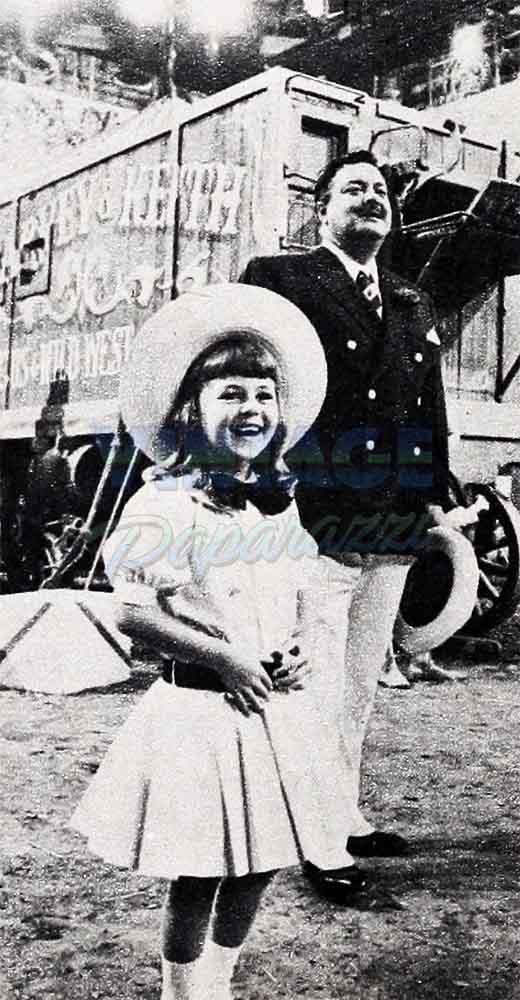
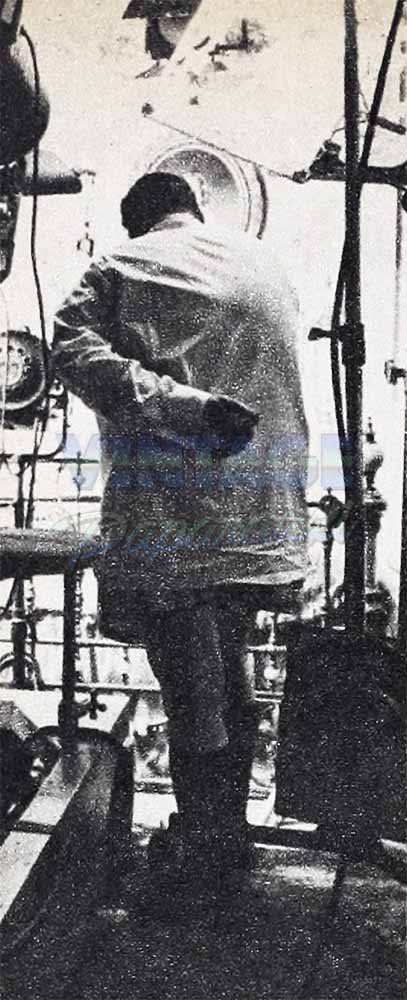
Jackie strikes out
This was not the first time that Jackie Gleason had stirred up the wrath of a ploy. Back in the late ’30’s the comic served a three-year stint at a roughhouse joint in Newark. known affectionately by its customers as “The Bucket of Blood.” His main activity, outside of introducing the other acts and doing impersonations of famous celebrities, was insulting the customers. the management and the help.
Sometimes his needling induced more than laughter. Take the morning after he married dancer Genevieve Halford, for instance. (He was twenty and she was nine-teen at the time.) The club had closed early, and the owners were treating bride, groom and pals to a wedding breakfast.
Everything was champagne and laughter until it came time to serve the special feast. But the chef went on strike and refused to cook the turkeys. His reason? The night before he’d heard Gleason tell the people in the club that whatever gravy was left over after they’d eaten would be bottled and sold as wallpaper paste.
The chef’s reaction to Jackie’s sharp tongue was mild compared to that of a fat. balding man who came into the club one evening. The customer heckled Jackie and Jackie gave him the needle right back. The MC’s barbs were crude but they also were effective.
“I dare you to come outside,” the customer yelled up at the MC.
Jackie grinned bravely. This would be a cinch. Why, he was bigger, younger and fatter than this guy. Nothing to it.
Jackie was right. There was nothing to it. “I never knew what hit me. Later on, they told me it was Tony Galento.” (Galento, in case you don’t remember, came close to being heavyweight Champion of the world.)
At least Galento was a pro, and being kayoed by him was no disgrace. But when he made that first trip to Hollywood, to have his ego battered and bruised by the studio people—that really hurt.
When he was dropped by the studio after “Desert Hawk” he decided to at least put Hollywood behind him in style.
He’d come out by train—with a wallet full of Baby Ruth wrappers; he was going back to New York by plane.
But the plane crash-landed at Phoenix and Jackie was stuck out in the middle of nowhere. The other passengers prepared to transfer to another plane and go on to New York. But that wasn’t for him. He could tell an ill omen when it hit him.
The trouble was that he wouldn’t be able to get a refund on his ticket until weeks later, and here he was with just a few dollars in his pocket and not even a Baby Ruth to call his own. But wait a minute! He had a check book; he was the Great Gleason. Easy. He’d cash a check.

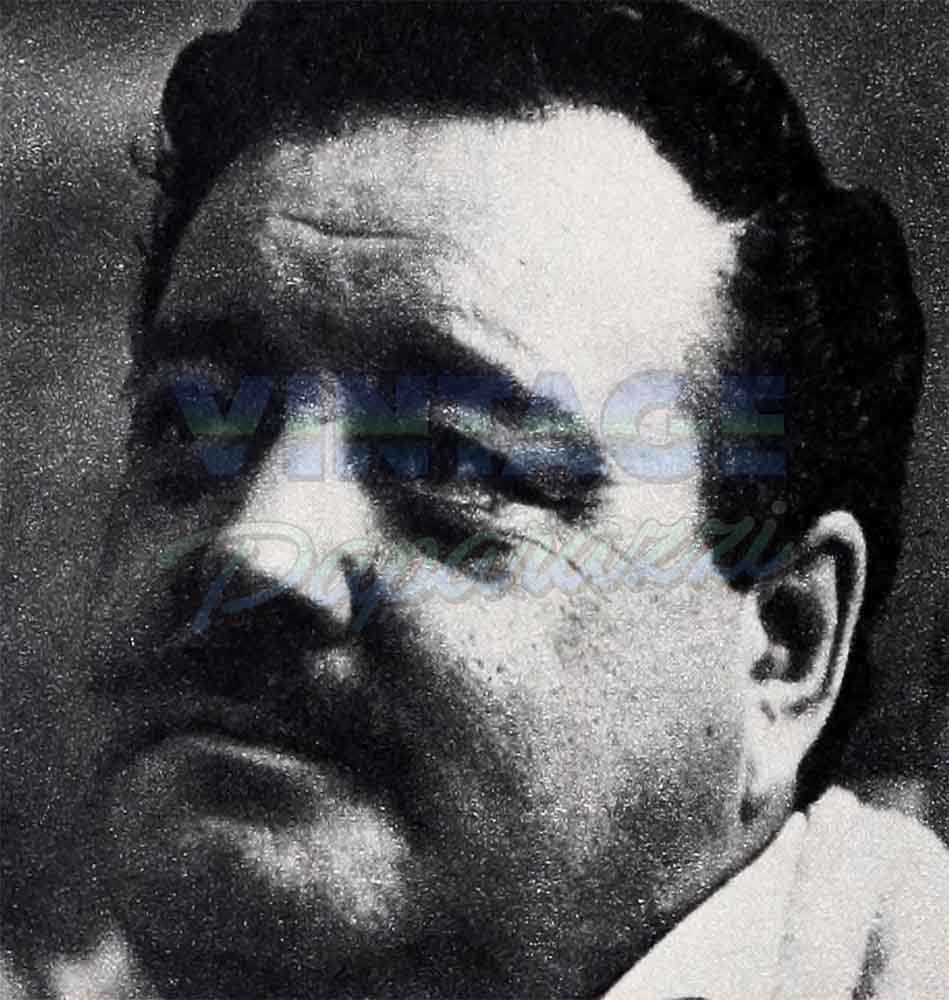
The airline turned him down; a bunch of banks turned him down; and he was forced to go from store to store along the main Street of Phoenix trying to find a yokel who would recognize the Great One and accept his check.
Finally, in a hardware store, he ran into the man he was looking for. A patron of the arts. A devotee of the cinema. A guy who said “sure” as soon as he was asked.
But hold everying—this Ace was a Joker; he didn’t take the Great Gleason at face value.
Positive identification? “Sorry, pal, I packed so fast I left all my important papers in Hollywood.”
But just as he was telling the hardware guy this, Jackie Gleason happened to look across the Street. There it was, the miracle! A marquee with the title “Navy Blues” on it. “I’m in that one,” Jackie said.
“Fine,” said the Joker who was beginning to be an Ace again. “Let’s go across and examine the still pictures behind the glass out front. That’ll be proof positive that you are who you say you are.”
Across the Street they went. But Jackie’s photo wasn’t among those in the “come-on” scenes. “A silly oversight . . . Jealousy among the cast . . . Can’t understand it.”
“Okay,” said the hardware guy, “why don’t we go in and see you?”
Jackie, always the big-shot, plunked down his last two bucks for tickets, and in they went. “Navy Blues” had been on more than an hour; through the rest of the film Gleason didn’t appear in a single shot.
“It’s the cut version,” he hrumphed. “Those so-called stars were so jealous that they threw their weight around and had my big scenes edited out.”
The hardware guy was patient. They’d see the picture again from the start. But first there was a newsreel. And a cartoon. And a full-length mystery. And coming attractions. And an intermission for the patrons to buy stuff from the stand at the back of the theater.
The hardware man said he was hungry; and Jackie, always the gracious host, dug down in his pocket, found fifteen cents and bought his guest a bag of popcorn.
The coming attractions flashed on and off. Then the title “Navy Blues” appeared on the screen, followed by a listing of the cast of characters. “See! See! There’s my name!” he yelled as “Jackie Gleason” loomed up and dissolved instantly.
But he didn’t see. His nose was deep in the popcorn bag and he was fishing out the last crumb from the bottom.
A third of the film went by. No Gleason. Suddenly, looking like a walrus in Navy whites, he covered the whole screen. “See? See?” he pounded the other guy on the back. “There I am. See?”
“That’s you, all right,” the store owner said, “you’re fatter in real life.”
“Good. Fine. Let’s go, pal. The check?”
“Sure. But let’s wait to the end of the picture. I never leave in the middle.”
Jackie waited. Once he dropped his hand carefully to the floor and picked up the paper bag the hardware guy had discarded. He ran his fingers all around inside it. He hadn’t left a crumb!
Early the next morning Jackie sat in the Phoenix station waiting for the milk-train that was to take him to New York. Automatically he munched on his fifth Baby Ruth. Finally, the train whistle broke in on his thoughts.
He went over to a gum dispenser and straightened his tie in the reflection of the dusty mirror. Then he cocked his hat and strode slowly towards the tracks.
In his mind he had a vision of his return to New York: he’d have his suit pressed and his hat blocked and get a shave at Grand Central; then he’d borrow some money from his agent and after that he’d take a taxi to Toots’ “saloon” and buy a round of drinks for everyone (he’d spend hours there telling the gang about his Hollywood triumphs); and he’d have his agent send his autographed picture to that Ace in Phoenix. . . .
“All aboard!” the conductor shouted.
“Hold it a second. pal,” Gleason called. He hurried back to the waiting room, put five pennies in a machine and slipped five squares of chocolate into his pocket.
Then, a smile on his face, he sauntered out to the train. As he climbed the steps of the coach, he said over his shoulder to the conductor, “Okay, pal. Tell the engineer I’m ready . . . And away we go!”
—JIM HOFFMAN
Jackie stars in “Gigot” for 20th and “Papa’s Delicate Condition” for Paramount.
It is a quote. PHOTOPLAY MAGAZINE APRIL 1963




